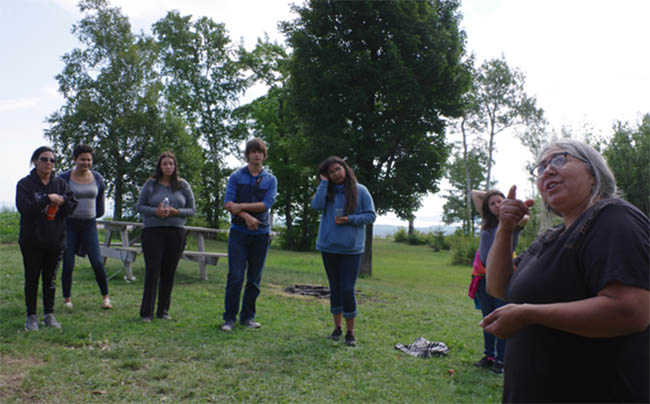Walking in Two Worlds Health Sciences Camp teaches youth about medicines and ceremony

By Rick Garrick
A workshop on Indigenous medicines and a sweat lodge ceremony were among the highlights for Fort William youth at the Northern Ontario School of Medicine’s Walking in Two Worlds Health Sciences Camp.
“We’ve been learning a lot about medicines,” says Everette Bannon, a Fort William mountain keeper. “We learned how to harvest tobacco from black diamond willow trees and dogwood.”
Bannon says the Indigenous medicines workshop presenter, Lac des Mille Lacs’ Audrey DeRoy, also showed the youth how to use bark from a tree for treating headaches. People should always consult a knowledgeable person from their area before using any plants from the wild.
“I had a headache and she told me that, so I was like: ‘I’m going to try that,’ and it worked,” Bannon says. “That was so cool.”
DeRoy held a medicine walk for the youth on Mt. McKay during her Indigenous medicines workshop, which was held on the third day of the camp. The camp was held by NOSM in partnership with Fort William from Aug. 14-18 at the Mt. McKay Pow Wow grounds.
“We have poplar, we have cedar, we have all kinds of small plants that are growing along the pathway up to the top of the mountain, like wild violet and ginger,” DeRoy says. “We’ll probably run into some wild roses and we probably have some black ash up here too. There is a lot of medicine up here.”
DeRoy says it is important to share knowledge with the youth about the Indigenous medicines.
“It builds your identity, who you are as a people — we’re the first peoples of Turtle Island,” DeRoy says. “(It) instils those teachings and the belief system so that they can carry it on for the future generations. It is very important; we’ve been doing that since time immemorial.”
Bannon also appreciated the opportunity to participate in his first sweat lodge ceremony on the fourth day of the camp.
“That was an amazing experience,” Bannon says.
Kaijah Collins-Baxter, a senior supervisor with the Fort William mountain keepers, also enjoyed the sweat lodge ceremony.
“That was my third one ever, so I enjoyed that very much,” Collins-Baxter says. “It was very gentle and calming and I had a very good experience.”
Collins-Baxter also participated in the Aug. 18 tour of the NOSM building, which is located on the Lakehead University campus.
“I was expanding my horizons and learning a lot,” Collins-Baxter says. “I want to attend college and university for Aboriginal advocacy and Indigenous law studies.”
In addition to the Indigenous medicines workshop and the sweat lodge ceremony, the camp also included a variety of teachings and information about health sciences.
“We came here to the NOSM building to get a Western perspective on medicine and what happens here at NOSM,” says Laura Calmwind, NOSM’s regional community coordinator. “I think the learning here at NOSM was really good, because it gave them a Walking in Two Worlds theme, finding that balance in education: getting their cultural education and academic education.”
The camp also included presentations by Indigenous knowledge keepers Phyllis Shaugabay and Leslie Gardner, second-year NOSM student Jason Beardy and Penny Moody-Corbett, NOSM’s senior associate dean and associate dean research.
NOSM developed the camp to inspire students to pursue and achieve a successful health career while walking in two worlds. The Mt. McKay camp was the third community-based health sciences camp held by NOSM.


